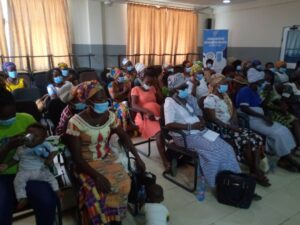Widows and Orphans Movement, a not-for-profit organization based in the Upper East Region has as part of International Women’s Day made a case for the scrapping of taxes slapped on Sanitary pads in Ghana.
This according to the movement has made the cost of pads quite expensive for many women and girls in rural areas.
The Executive Director of the Movement, Fati Abigail Abdulai explained that many women and girls are torn between buying basic ingredients for the preparation of food in the house or spending between 20-25 cedis to buy sanitary pads.
Concerns over the cost of the pad being a concern resonated strongly at the engagement with 12 women groups from Bongo, Kassena Nankana Municipal, Builsa North Municipal, and Kassena Nankana West District Assemblies to commemorate the international women’s day.
The engagement forms part of a collaboration with WaterAid Ghana in the implementation of a five-year project dubbed “Sexual Health and Reproductive Education” (SHARE) with funding from Global Affairs Canada.
There is a luxury tax of 20% and an additional 15% VAT on an imported sanitary pad and this has brought the cost of pads to between 20 and 25 cedis.
With hygiene being a key part of the partnership and the implementation, Madam Abdulai details that the high cost of pads is not helping women and girls to live decently. Relaying the concerns of the women, she said this is luring girls in rural settings into transactional sex hence the need to intensify the calls for the scrapping of the tax.
“Some are even talking about how expensive it is to be able to buy sanitary for themselves and their children which is leading some of these girls to rely on men which also leads to pregnancy and other STIs. It is really a big deal because one of the women said the pad is between 20 and 25 cedis and they are often torn between buying ingredients as compared to the pad so obviously they go for the food since food security is a challenge.
So, we need to intensify advocacy for the scrapping of the tax on sanitary pads,” she indicated

On her part, Aliu Fauzia, Policy Officer for WaterAid Ghana raised concerns about how the school environment not being conducive for girls who are menstruating and thereby forces them out of school for days.
The women from Kassena Nankana Municipal identified many issues as challenges they face in their respective communities including teenage pregnancy, open defecation, inadequate water supply, unequal opportunities in every aspect of life, and a high rate of poverty.
Those from Builsa North Municipal, are challenged by inadequate health facilities, very little support from their husbands, poor access to clean water, and a lack of dams for dry-season farming.
In the same vein, women from Kassena Nankana West District say poverty is the most pressing challenge followed by a lack of waste bins at vantage points, inadequate health facilities, and a lack of toilet facilities.
It is, however, their hope that they can work with stakeholders to address pressing community needs.




